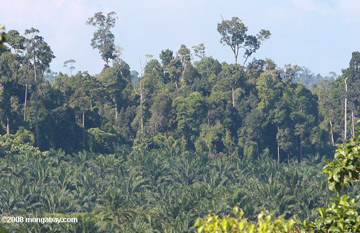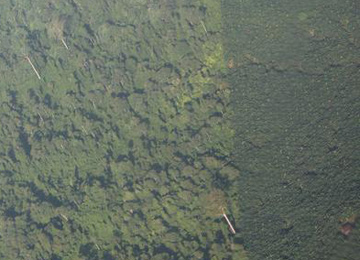Palm oil firms pledge to stop clearing rainforests in Indonesia
Palm oil firms pledge to stop clearing rainforests in Indonesia
mongabay.com
May 13, 2008
|
|
Palm oil companies operating in Indonesia pledged to stop clearing forests for new plantations, reports The Jakarta Post. The move is a response to growing criticism that oil palm expansion is destroying biologically-rich rainforests and contributing to global warming.
Speaking in Jakarta at a seminar on climate change, agriculture and trade, Didiek Hadjar Goenadi, executive director of the Indonesian Palm Oil Association (GAPKI), said that palm oil companies would only develop “idle land”, including former forest concession areas.
“We realize the environmental impacts by opening all our forests so we will stop touching the forest and just concentrate on abundant lands which have not been cultivated yet,” Didiek was quoted as saying.
 Oil palm plantation abutting tropical rainforest.  Oil palm plantation abutting logged over forest in Borneo. |
Didiek estimates that Indonesia has some seven million hectares of idle land suitable for oil palm or rubber plantations.
Didiek added that while some companies are adopting “greener” practices set forth by the roundtable on sustainable palm oil (RSPO), many small farmers — accounting for nearly half of production — are unaware of such cultivation techniques. He called on the Indonesian government to educate small holders on RSPO regulations.
Indonesia is the world’s largest palm oil producer, producing 17.2 million tons in 2007. About 6.7 million hectares of plantation are currently in the country.
Environmentalists say oil palm expansion in Indonesia — especially on the islands of Sumatra, Borneo (Kalimantan), and New Guinea (Papua) — is fueling deforestation and threatening endangered species like the orangutan. The country lost more than 1.8 million hectares (4.7 m acres) of forest annually between 2000 and 2005. Scientists say the clearing of forest and peatlands is also releasing large amounts of greenhouse gases into the atmosphere.
Palm oil firms vow to stop using forests. May 13, 2008. Adianto P. Simamora, The Jakarta Post, Bogor.
Related
Unilever calls for ban on rainforest destruction for palm oil
(05/01/2008) Unilever, the world’s largest consumer good company, will start using palm oil from certified sustainable sources this year and aims to have all its palm oil certified by 2015, according to a speech delivered today by CEO Patrick Cescau. Cescau also voiced support for a moratorium on rainforest destruction for oil palm plantations in Indonesia.
Malaysian palm oil industry puts sustainability in the spotlight
(4/17/2008) Seeking to differentiate its palm oil from that produced less responsibly in other countries, the Malaysian Palm Oil Council (MPOC) sponsored a three-day meeting this week in Kota Kinabalu, on the island of Borneo.
Palm oil boycott an unrealistic approach to conserving biodiversity
(4/15/2008) Boycotting palm oil produced in Southeast Asia in an “unrealistic” and “ineffective” approach to conserving the region’s fast-disappearing rainforests, said a Princeton University researcher speaking at a conference on the sustainability of palm oil. Instead, NGOs should focus on engaging and working with the palm oil industry to reduce its impact on the environment. Addressing the first International Palm Oil Sustainability Conference in Kota Kinabalu, Malaysia, Princeton biologist Dr. David S. Wilcove said that the palm oil industry is too important to the economies of Indonesia and Malaysia to justify blanket import bans on the edible oil used in food, cosmetics, industrial products, and biodiesel. The palm oil industry contributes to health, education, and infrastructure in rural areas.